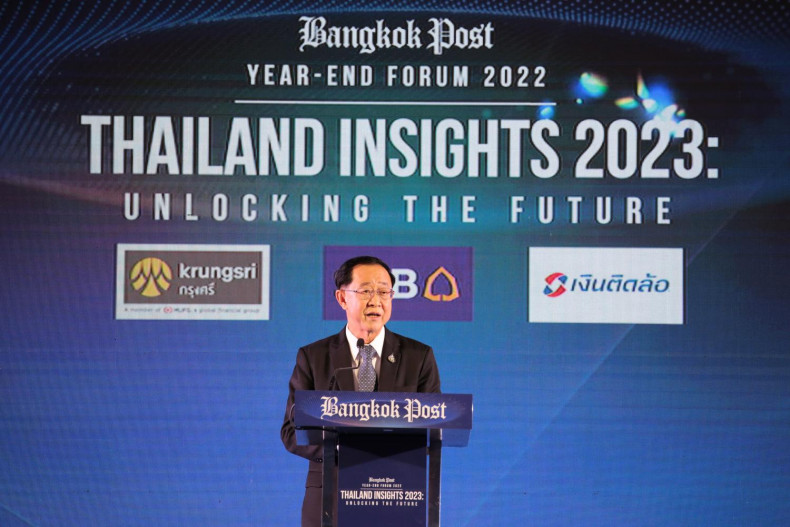
The economy remains firmly on a path towards economic recovery despite growing uncertainties from inflation, geopolitical risks and a potential global recession next year, the finance minister said on Wednesday.
Arkhom Termpittayapaisith said tourism is helping drive Thailand's recovery after the Covid-19 pandemic. During the first 10 months of this year, the kingdom welcomed nearly 7.2 million foreign tourists, not far short of its 10 million target.
"We expect the tally will hit 10 million foreign tourists on Dec 10, which is one-fourth of the pre-Covid record in 2019. We expect this number will continue to grow in 2023," Mr Arkhom said while delivering his keynote speech at the Bangkok Post Year-End Forum 2022, titled "Thailand Insights 2023: Unlocking the Future". The forum was held at the Centara Grand at CentralWorld on Wednesday.
He added that the economy in Q3/2022 recorded the fastest growth in a year of 4.5% as a result of the pick-up in tourism as the country approaches the high season and amid rising domestic consumption.
RELATED
During 2023–2027, the government will run a "reform and resilience" strategy that aims to rebuild high-value tourism and attract affluent tourist groups consisting of wealthy global citizens, wealthy pensioners, professionals and highly skilled professionals, he said.
"We hope to restructure our tourism sector to not only make it more resilient but also more sustainable by the end of 2032 as tourism will continue to be a strong driver of our economy for years to come," Mr Arkhom said.
As for investment, he said Thailand attracted over 1 billion baht in foreign direct investment in the first 10 months of this year, increasing 72% from the previous year. "We are pleased to hear that many leading global companies have announced plans to make investments in Thailand," he said.
Mr Arkhom also talked about future policy direction, climate change and human resource development for sustainable growth. He said these key areas would also help the economy navigate stormy waters next year.
He said policy implementation comprises two approaches: policy normalisation and policy coordination. The Ministry of Finance and the Bank of Thailand coordinate in setting stabilisation goals, growth and inflation targets to achieve long-term sustainable growth objectives.
"[Despite] rapid interest rate rises globally, the Bank of Thailand has said clearly that Thailand's policy rate rise will be gradual to ensure a smooth take-off of the economy.
"The policy rate rise has remained accommodative to the overall economic recovery while fiscal policy will be more targeted to help ease the burden arising from higher prices," he said.
He also highlighted the importance of climate change to ensure economic stability. The government was committed to addressing climate change, and the Bangkok Goals on Bio-Circular-Green economy were adopted during the Asia Pacific Economic Cooperation (Apec) summit last month.
He said the Finance Ministry had provided tax incentives and adopted sustainable finance for businesses such as electric vehicle production and purchasing.
"We want to make Thailand an EV hub. For sustainable finance, we are the first nation in Asean to issue a sustainability bond in 2020 now worth 250 billion baht. This means that more proceeds will be allocated to green and social projects, and we have plans to issue more to mobilise funding into this area," he said.
Lastly, he said the labour force would need to upskill to meet the challenges of an ageing society. "The development of artificial intelligence also makes it necessary for the labour force to update their skills," he added.